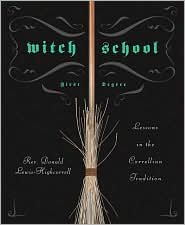Witch School was founded online (as witchschool.com) in 2001 by the Correllian Nativist Tradition, which was founded in 1879. Originally a family tradition, in 1979 the decision was made to open the tradition to the public via a series of correspondence lessons, created (in part) by the Rev, Don Lewis. These lessons took seven years to create, but revisions and upheavals within the tradition (including the passing of several Elders) delayed their presentation to the outside world until 1999.
In my opinion, it is important to see the Correllian Nativist Tradition and Witchschool.com as two entirely separate entities because although the Tradition founded the School, the latter has almost nothing to do with the Tradition but instead provides an easily accessible, inexpensive and extremely general (and often shallow) look at a variety of occult topics. Witchschool is, however, very popular. The School boasts of having more than 200,000 students, making it (to my knowledge) the largest occult organization in the history of modern paganism. The generality of the majority of the lessons and the large size of the student body are two things that have generated a great deal of controversy in the witch community.
So it is important to separate the two. Although this series of four books are labeled ‘WitchSchool’ it would be more accurate to say they are ‘Correllian Nativist’ as the lessons and structure are the public documentation of this Tradition’s teachings.
First Degree is based on the idea that it will take the reader a year (and a day) to work with care and attention through the twelve lessons presented, at the end of which s/he would be ready for initiation into the Tradition’s First Degree. (Like many Wiccan systems, the Tradition recognizes three degrees of increasing knowledge.)
Each lesson is composed of several parts: the actual lesson, exercises to develop skill in that area, practical experience (spellwork using the lesson), a deity (a clever device to introduce the reader to the multiple faces of the Divine), a glossary (to explain words which may be unfamiliar), and study questions (13 for each lesson).
The lessons are fairly basic (as is appropriate) and generally progresses from theory (the meaning of magic, the Airts) to experiential (creating sacred space, working with energy) to the practical (herbs, oils & incense, stones). As a teacher myself, I would probably have refined the progression further (the chapter on Garb, for example, would go better towards the end rather than between Invocation and Symbols). I was also very disappointed that the reader is never asked to keep a journal of his progression through the lessons. The Book of Shadows is not just a static document it’s a unique record of the witch’s development and her idiosyncratic journey into knowledge.
There are distinct differences in the teachings from what many of us from Gardner-based traditions have been taught. I want to be very careful to avoid saying that one way is right and the other wrong: there are many paths to the top of the mountain after all. I found some of the attributions for the chakras unique – mars for the second chakra (the belly) for example – and the assertion that movement deosil is connected to God and matter, whereas widdershins is the Goddess and spirit. The relatively recent use of affirmations is heavily relied upon in this Tradition, which I also found odd.
One of the highlights of this series is the deeper look into this little-known Tradition. There are few mentions of their beliefs in general circulation and fewer well-known public personalities. Moreover, their Wicca is distinctly different from that practiced by Gardner and his descendents, making this a rich resource for newcomers to witchcraft.
The lessons presented are solid and well-designed. As with all learning, if the student truly ‘works’ the exercises s/he will develop a rich esoteric practice and experience spiritual transformation. All the more so if s/he supplements the lessons by reading what others have said and – of course – testing it all out through personal experience.
The God/dess gave us brains, we don’t need to drop them on the floor.
~review by Lisa Mc Sherry
Author: Rev. Donald Lewis-Highcorrell
Llewellyn Worldwide, 2008

